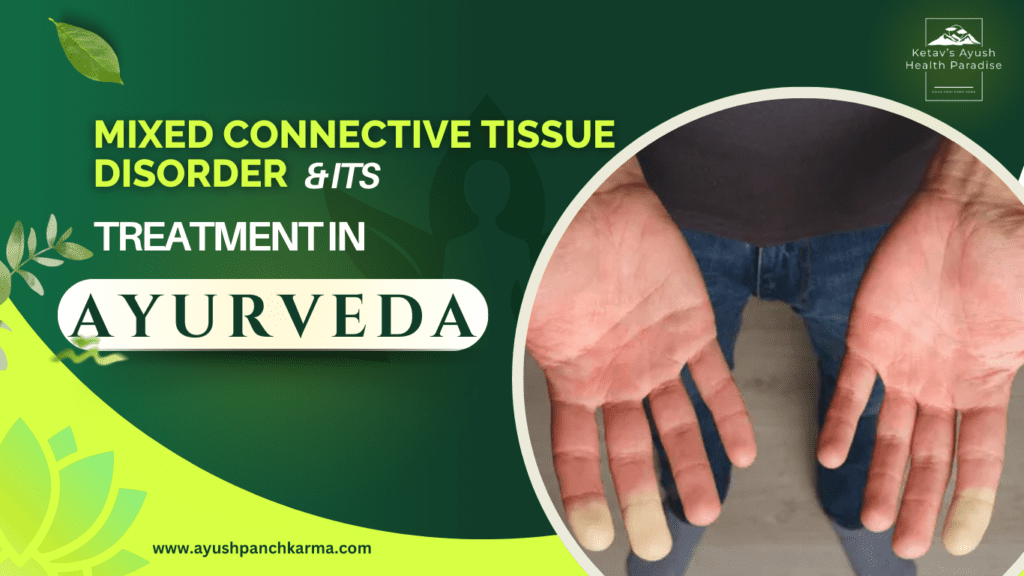Overview
Mixed connective tissue disorder comprises of multiple disorders occurring together and manifest complex of sign and symptoms. MCTD is an autoimmune disorder mostly involve connective tissues like blood, bones, cartilages, muscles, adipose tissue and skin. When immune system attacks these tissue and cause inflammatory changes all together manifest , usually three complex conditions- Lupus (SLE), Systemic Sclerosis and Polymyositis. In the early stage of MCTD, body dose not shows much signs and symptoms, patient only feels some fatigue and lethargy, but with the progress of decay, different signs and symptoms appear. Common symptoms which can easily be noticed include – weakness of muscles, fever, stiffness in joints, symptoms and signs related to the heart, lungs and skin.
In the Ayurveda management of MCTD, we primarily work to flush out the toxins from the tissues by classical Ayurveda Shoshana therapies (The Panchkarma). Secondly balance of Ojas (immune system) is reset by rejuvenation and shaman therapies. This Ayurveda line of treatment help to reset the balance and reverse the condition of MCTD in the natural way.
What is MCTD?
MCTD – mixed connective tissue disease, is an autoimmune disorder in which the immune system attacks the own body connective tissues, produce complex inflammatory condition. Usually there will be combination of three diseases like lupus, Systemic Sclerosis and Polymyositis. These conditions together promote the accumulation of toxins in the body leading to inflammatory changes in the vasculature of the connective tissue.
Sign and Symptoms of MCTD;
As there are three disease conditions present in MCTD, hence mixed sign and symptoms of all three conditions can be seen and most common are;
Fatigue, fever, muscle pain, joints pain, low energy, weight loss and skin conditions.
Risk Factors;
In case of delay in treatment or no treatment MCTD can affect the heart, lungs, kidneys, and other organs and complications include:
High blood pressure in the lungs, heart disease, lung disease, damage to kidney, damage to digestive system and tissues damage or death.
Diagnosis of MCTD;
Along with physical examination for the sign and symptoms, high levels of antinuclear antibodies (ANA) and an antibody to ribonucleoprotein (RNP) in blood investigation give the positive diagnose of MCTD.
Ayurveda view of MCTD;
We do not get direct reference of mixed connective tissue disorder in Ayurveda. Here sign and symptoms show involvement of all doshas (vata, pitta and kapha) and multiple dhatus (tissues) like rasa, rakta, mamsa, asti etc. As in modern science we call MCTD is an autoimmune disease, having multiple manifestations, same way Acharya Sushrutha has explained about OJUS VIBHAMSHA and OJUS VYAPAT which can be closely correlated to the MCTD.
They are;
Sandhi vishlesha – Multiple joint pain and loss of strength in the bones and joint.
Gatersada — pain and fatigue in the body
Dosha chyavana – derangement of the doshas
Kriya Sannirodha — disturbance of normal physiology
Stabdha Gurugaterta—stiffness and heaviness of the body
Vata shopha — swelling in the body
Varna bheda — discoloration of the body
Glani – physical and mental fatigue
Tandra – depression, improper functioning of the senses
Nidra – excessive sleep
In Ayurveda Ojus is said to be essence that sustain life, if the Ojus get destroyed human being will also parish. Ojus is exactly correlated to immunity. Acharya Charka says, the way honey bees collect nectar from different flowers and convert it in to honey, in the similar way in human ojus is collected as an essence of diet, actions, habits and qualities. When this ojus get deranged it loses its functions and cause disease conditions.
Treatment of MCTD;
In Modern system of medicines inflammatory drugs, steroids, and immunosuppressive agents are the mainstays of treatment. These treatment approaches give symptomatic relief initially but for the long time use these are not favourable and have side effects.
Ayurveda approach is to reset the harmony in between doshas and dhatus and correct the immune functions. At Ketav’s Ayush Health Paradise our primary step towards treatment is to correct the autoimmune response in the body by Panchkarma Shodhna therapies. Secondly we concentrate on involved Dosha – Dhatus and related sign & symptom and their pacification by shaman therapies. Panchkarma treatment plan is customized as per individual constitution and factors likes severity of disease, strength of the patient, organ system involved in the disease etc. Shaman therapy are planned to balance vitiated Dosha-dhatus and alleviating sign and symptoms. We follow a holistic approach to treat MCTD and enhancing the overall well-being by Panchkarma, oral medication, yoga, diet and behavioural regimens.
At Ketav’s Ayush Health Paradise we follow a set of planned therapies and this is for 21 days in the first set. Which include customized therapies for the individual, along with some oral medicines in the form of decoctions / powder / pills / capsules / jams etc. There will be food regimen and daily regimen instructions during the whole treatment plan. Along with this yoga-meditation and energy healing are the important part of the schedule.
“Right treatment at right time, can save the precious life”
By Dr. Seema Santoshi


